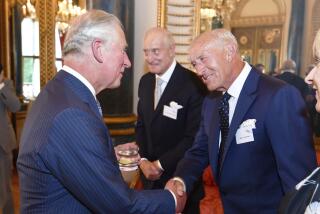Leon Gorman dies at 80; founder’s grandson turned L.L. Bean into national retailer
- Share via
Leon Gorman, a grandson of L.L. Bean who transformed a modest catalog company with a single store into a national retail presence with sales topping $1.5 billion, had died. He was 80.
Gorman died at his home in Yarmouth, Maine, after battling cancer for several months, the company said.
He led the firm carrying his grandfather’s name as chief executive or chairman for 46 years before retiring from the Maine-based company as chairman of the board in 2013. He retained the title of chairman emeritus.
Gorman led a modernization of his family’s outdoor clothing and gear retail business after the founder’s death. Under his leadership, L.L. Bean grew from 100 to 5,000 employees and shifted from a one-store outlet to a multichannel retailer.
An outdoorsman like his grandfather, Gorman was a key figure in the conservation movement, helping preserve the Appalachian Trail’s 100-mile wilderness. Last year, he donated an old L.L. Bean hunting preserve in Casco Bay to the Maine Coast Heritage Trust.
He wasn’t afraid to roll up his sleeves when it came to volunteering. He served for 12 years as a volunteer at a soup kitchen in Portland, Maine, making scrambled eggs and French toast for the homeless every Wednesday morning.
Founded in 1912, L.L. Bean got off to an inauspicious start after Leon Leonwood Bean obtained the state’s list of out-of-staters with hunting licenses and sent mailings touting his rubber-soled hunting boot.
Ninety of the first 100 pairs sold were returned after the leather separated from the rubber. Bean won loyalty and goodwill when he returned the customers’ money, a satisfaction guarantee that endured.
He opened his store five years later.
Born Dec. 20, 1934 in New Hampshire, Gorman was reserved and soft-spoken compared with his grandfather, and had the difficult task of keeping the company on an even footing after Bean’s death in 1967.
He said there were concerns at the time about the company’s survival, but the retailer’s annual sales, then $5 million, continued to grow. Gorman is credited with modernizing the company, formalizing its “customer first” policies, creating the first computerized customer database, expanding stores outside of Maine and pushing into online retailing.
Gorman also personally tested many of the company’s products.
Twenty-five years ago, Gorman said he hoped the company would be remembered for, among other things, its “values and integrity,” for fulfilling responsibilities to stakeholders and for treating customers and employees as “human beings.”
More to Read
Sign up for Essential California
The most important California stories and recommendations in your inbox every morning.
You may occasionally receive promotional content from the Los Angeles Times.












